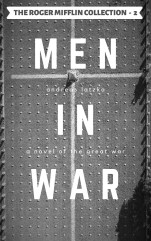Today I release the first three paperback editions of the Roger Mifflin Collection: The Haunted Bookshop by Christopher Morley, Men in War by Andreas Latzko, and Trivia by Logan Pearsall Smith, three forgotten classics that deserve to be remembered.
The Haunted Bookshop is, for lack of a better genre, a mostly-cozy mystery about a book that keeps disappearing and reappearing, a young man who meets a young woman, and the most amazing bookshop owner in modern-ish literature, Roger Mifflin.
Mifflin is an endless source of great books. In a previous novel, Mifflin had hitched a wagon full of books to a trusty horse and roamed the countryside introducing the people he met to their perfect book. In this sequel, he has set up a storefront in Brooklyn, where he continues the life mission he set out in his first book:
“When you sell a man a book, you don’t sell him just 12 ounces of paper and ink and glue – you sell him a whole new life. Love and friendship and humor and ships at sea by night – there’s all heaven and earth in a book, a real book I mean. Jiminy! If I were the baker or the butcher or the broom hustler, people would run to the gate when I came by – just waiting for my stuff. And here I go with everlasting salvation – yes, ma’am, salvation for their little, stunted minds – and it’s hard to make ’em see it. That’s what makes it worth while – I’m doing something that nobody else from Nazareth, Maine, to Walla Walla, Washington, has ever thought of. It’s a new field, but by the bones of Whitman it’s worth while. That’s what this country needs – more books!”
When our young man first enters the shop, he finds a note tacked to a bulletin board:
If your mind needs phosphorus, try “Trivia,” by Logan Pearsall Smith.
If your mind needs a whiff of strong air, blue and cleansing, from hilltops and primrose valleys, try “The Story of My Heart,” by Richard Jefferies.
If your mind needs a tonic of iron and wine, and a thorough rough-and-tumbling, try Samuel Butler’s “Notebooks” or “The Man Who Was Thursday,” by Chesterton.
If you need “all manner of Irish,” and a relapse into irresponsible freakishness, try “The Demi-Gods,” by James Stephens. It is a better book than one deserves or expects.
It’s a good thing to turn your mind upside down now and then, like an hour-glass, to let the particles run the other way.
One who loves the English tongue can have a lot of fun with a Latin dictionary.
ROGER MIFFLIN.
That note became the catalyst for The Roger Mifflin Collection, new editions of the books that the little red-haired man recommends during the course of the adventure:
- The Haunted Bookshop, of course, because it’s the origin story.
- Men in War, a book about the horrors of combat “so damned true that the government suppressed it.”
- Trivia, a delightful little book of aphorisms that, truth be told, inspired four of the last five books under my name.
The next round, coming within a month or so:
- The Man Who Was Thursday (see above)
- The Demi-Gods (see above)
- War Poems by Siegfried Sassoon, which Mifflin pairs with Latzko in his epic rant against the Great War:
“Sometimes I thought Truth had vanished from the earth,” he cried bitterly. “Like everything else, it was rationed by the governments. I taught myself to disbelieve half of what I read in the papers. I saw the world clawing itself to shreds in blind rage. I saw hardly any one brave enough to face the brutalizing absurdity as it really was, and describe it … Perhaps half a dozen of them have told the truth. Have you read Sassoon? Or Latzko’s Men in War, which was so damned true that the government suppressed it? Humph! Putting Truth on rations!”
I released the first three books in hardcover and was met with a great ho-hum. I’m hoping by releasing them to a wider market will find some of these great (yes, great) books a new audience, not just because Roger says they’re worth your while, but because I’ve taken his advice and seen for myself, and I say so, too.
Like this:
Like Loading...










